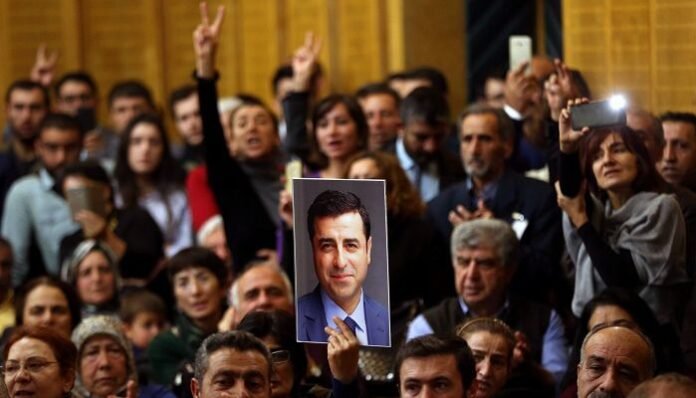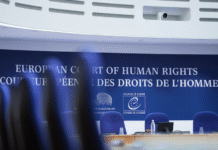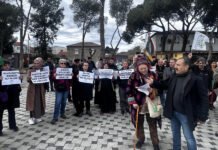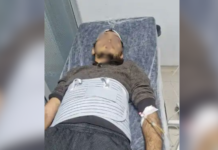
An Ankara court on Thursday issued a verdict in the long-running Kobani trial and handed down lengthy prison sentences for dozens of Kurdish politicians, including imprisoned leaders Selahattin Demirtaş and Figen Yüksekdağ, Turkish Minute reported, citing the Birgün daily.
Demirtaş is among 108 former pro-Kurdish Peoples’ Democratic Party (HDP) politicians who stood trial. The HDP is the predecessor of the pro-Kurdish Peoples’ Equality and Democracy Party (DEM Party).
The Ankara 22nd High Criminal Court made its ruling during the 83rd hearing of the trial, which concerns deadly protests in 2014.
Demirtaş was sentenced to 42 years, reduced from an initial aggravated life sentence, while Yüksekdağ received a total of 30 years, three months.
Other sentences included 10 years for Ahmet Türk, mayor of the predominantly Kurdish province of Mardin, and 13 years, four months for Ali Ürküt, a member of Turkey’s broadcasting watchdog RTÜK.
Former HDP vice chair Alp Altınörs was sentenced to a total of 22 years, six months, while Aynur Aşan received nine years.
Ayla Akat Ata, a former member of parliament, was sentenced to nine years, nine months but was released pending appeal.
Former HDP executives Bülent Parmaksız and Cihan Erdal received 23 years and 20 years, six months, respectively.
Former HDP deputy Sebahat Tuncel was sentenced to 12 years but was released considering time served.
Several individuals were acquitted, including former HDP deputy Altan Tan, former mayor Ayhan Bilgen, former deputy Aysel Tuğluk, Bircan Yorulmaz, DEM Party deputy Sırrı Süreyya Önder and former HDP deputies Emine Beyza Üstün and İbrahim Bilici as well as politician Gülfer Akkaya. The youngest defendant, HDP member Can Memiş, was also acquitted.
In total, five defendants out of the 18 who were imprisoned were released considering time served: Kışanak, Tuncel, Ata, Ayşe Yağcı and Meryem Adıbelli.
The trial has lasted almost three years.
The Kobani trial centers on the events of October 6-8, 2014, when the Islamic State in Iraq and the Levant (ISIL) laid siege to the Syrian town of Kobani. Protests broke out across Turkey, particularly in the southeastern provinces, which are predominantly Kurdish.
The Turkish government accused the leaders of the HDP of instigating the protests, which claimed 37 lives.
Demirtaş and other defendants have always denied the accusations and argued that their calls for solidarity with Kobani were democratic and within the framework of freedom of expression.
DEM Party co-chairs Tülay Hatimoğulları and Tuncer Bakırhan condemned the harsh sentences in the Kobani trial. They declared the decision a black mark in Turkey’s legal history and refused to recognize the verdicts.
Hatimoğulları and Bakırhan criticized the trial as a political purge and claimed that those responsible for this injustice have harmed the future of Turkey.
The trial has significant political implications, especially for the Kurdish politicians, who has been under intense pressure from President Recep Tayyip Erdoğan’s government. The government’s stance has hardened following the failure of peace talks with the outlawed Kurdistan Workers’ Party (PKK) in 2015, leading to a more nationalist and anti-Kurdish policy.
The ongoing detentions of Kurdish politicians have drawn significant attention and criticism from both local and international observers who argue that the charges against them are politically motivated and part of an ongoing government crackdown on Kurds.
Before the hearing, there was speculation that the government’s attitude towards political prisoners could change for the better and lead to the release of figures such as Demirtaş and imprisoned philanthropist Osman Kavala, which did not materialize with the court deciding to hand down long sentences.
Demirtaş has been jailed since November 2016 on bogus terrorism-related charges and not released from prison despite rulings from the European Court of Human Rights.














